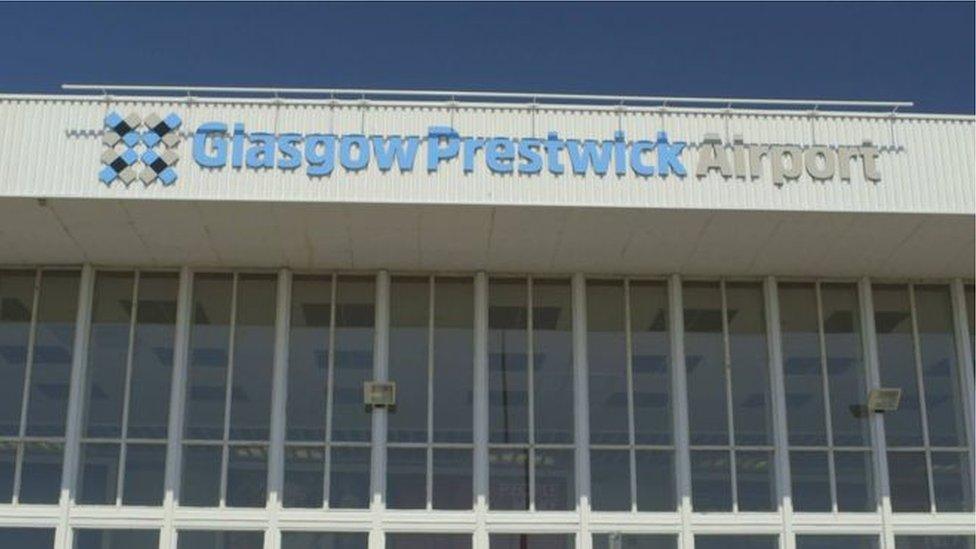Risky business with Scots cash
- Published

Covid and Brexit have put unprecedented pressure on public finances, and the watchdog still cannot see what risks are being taken
The auditor-general is calling for more clarity as well on the links between tens of billions of pounds being spent and what the outcomes are
More than £200m in Scottish government loans and liabilities to back four troubled companies is now worth close to nothing. It's being told that it needs to learn lessons and draw up rules before it happens again
"The pandemic and ongoing uncertainty of EU withdrawal pose significant risks to the sustainability of public finances". So says Stephen Boyle. It's his way of expressing alarm, in measured tones that won't put you off your tea.
Neither cause is in the control of the Scottish government. But the sustainability issue is one that it has to confront, according to the auditor-general.
Some £669m overspent last year, when it is supposed to balance its budget, is understandable in the circumstances of a major health emergency gathering pace. The financial year being audited finished two weeks after the UK's lockdown began. Capital was underspent, but day-to-day "revenue" spend was 2% over budget.
Risks and liabilities
Since then, 12 times as much - £8.2bn - has been added to the block grant. Some funds have been shifted from underspent budgets at St Andrew's House. Unexpected costs in the final four months of 2020-21 have £330m set aside for them.
We have no idea yet what has happened to Scottish income tax receipts, but they're unlikely to be healthy. And we don't know how hard Brexit is going to hit the economy, but that, too, is an uncertainty that weighs heavily.
Stephen Boyle, who took over the auditor-general role in the summer, is calling for a much clearer picture of the risks and liabilities that the Scottish public sector faces, alongside its assets. The cost of past commitments to Public-Private Partnerships in building schools and hospitals, for instance. Annual payments contribute to a £9.6bn liability.
He wants consolidated accounts to be published which will make it much easier to see the sustainability of Holyrood's finances. That much has been promised since 2016. A draft was pulled together, but the process then seemed to stall.

Prestwick Airport is one of the companies bailed out by the Scottish government
The watchdog is demanding the project to improve clarity is fired up again, starting with a target date for publication, set publicly.
He is also returning to a theme developed by his predecessors - that it is hard to see from the Scottish government's numbers how spending is aligned with outcomes.
That requires ministers to show the ways money is being deployed to reach their own targets.
Audit Scotland doesn't set those policy targets or comment on them: its job is to see how well or badly they are being met. It's not an easy task, but it's an important one, particularly as we head into election season:
"The Scottish government needs to quicken the pace of its work to provide a more comprehensive performance report of its own performance," reports the auditor-general. "In doing so, it would increase transparency, enhance reporting to the Scottish Parliament and the public, and help strengthen accountability and scrutiny."
Rough territory
His report into Scottish government accounts heads into particularly rough territory in assessing ministers' record in supporting or bailing out private companies.
Prestwick Airport: since being bought for £1 in 2013, the Scottish government had loaned it £43.4m by last March. The chances of getting that back are slim, so the accounts have written down that loan value to £10m
Ferguson shipyard: a £97m contract for two Cal-Mac ferries has become a project costing at least double that, having also had £45m in Scottish government loans, now valued at nil. The accounts disclose that a further £17m has been spent by ministers on the yard, to keep it open through administration and beyond
Stephen Boyle concludes: "Looking ahead it will be important for the Scottish government to clearly outline and maintain effective sponsoring arrangements for (Ferguson shipyard), including clear roles and responsibilities as well as clarity over future funding arrangements and expectations of organisational performance and delivery of outcomes".
In other words, it has not yet done so, a year after nationalising the business.
BiFab, or Burntisland Fabricators: three yards, carrying the torch for Scotland's hopes of jobs from offshore renewable energy. As of last Monday, it is in administration, having had around £37m sunk in equity and £13m paid out in loans. Only a portion of the loans might be recovered
Lochaber Aluminium Smelter: after Indian-run Liberty Group took over and saved steel works in Motherwell, the Scottish government warmed to its idea for taking on the hydro plant and aluminium smelter already established near Fort William
It liked even more the idea of a major factory of alloy wheels, supplying the UK motor industry. So ministers agreed to provide a financial guarantee to the Liberty Group - a promise to buy hydro power if the company does not fulfil its contractual obligations to buy power over 25 years.
The guaranteed annual amounts vary between £14m and £32m over the lifetime of the contract.
For this, there's a sort of insurance policy: Liberty agreed to pay the Scottish government an annual fee. In 2016-17, the value of that promise to pay the annual insurance fee was put at £21.4m.
But things have not gone to plan, partly because Brexit has undermined UK car manufacturing. The Lochaber alloy wheel giant has been melted down to a recycling yard.
Greater transparency
With an assessment of "expected credit losses", the £21.4m bond is now valued at nil.
And yet there's still a legal requirement to purchase that power. Liberty sold on the right to that flow of funds, as an asset within its complex international financing arrangements.. The reckoning on the government's potential exposure to default payments has been raised to £36.7m.
The auditor-general concedes that there can be reasons for "financial interventions": such as the strategic importance to employment and the economy.
But such assessments don't seem to be carried out, and he is repeating the call made by his predecessor, Carolyn Gardner, that the Scottish government has to draw up a framework or ground rules for when and how to intervene, and there has to be more clarity about the funding and liabilities involved.
The case for this becomes even more pressing when a lot of companies are at risk of keeling over, and when a huge burst of public expenditure and borrowing has made it seem there is plentiful funding to spend on protecting companies. Stephen Boyle talks of "increased expectations and demands on the public sector to provide financial support".
So there is an urgent need for the Scottish government to learn lessons from this growing list of expensive failures. It needs to "clearly outline its plans for future investment in private companies to ensure there is greater transparency over financial support provided and the value of public funds committed".
Related topics
- Published13 June 2019

